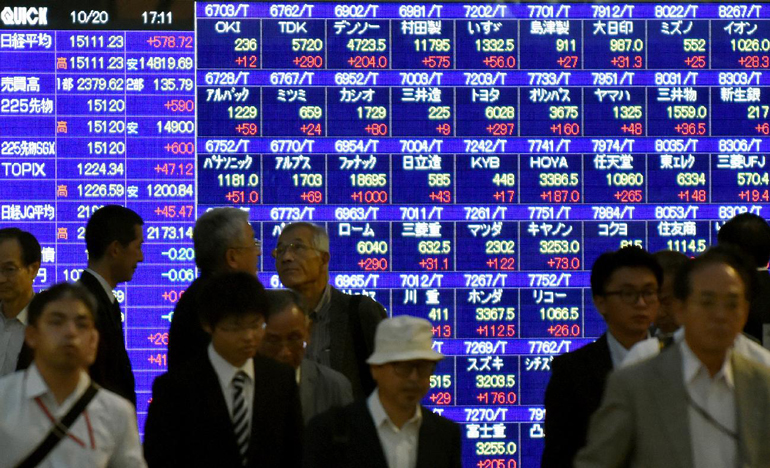Saturday Feb 21, 2026
Saturday Feb 21, 2026
Saturday, 25 July 2015 00:00 - - {{hitsCtrl.values.hits}}

Reuters: Asian equities stumbled on Friday after a survey showed China’s manufacturing activity crumbled to 15-month lows, rekindling concerns for the region’s exports as the world’s second-largest economy struggles to arrest a broad downturn.
MSCI’s broadest index of Asia-Pacific shares outside Japan was down about 1% in early trading, on course for a weekly loss of more than 2% - one of the biggest slides this year.
Financial spreadbetters expect Britain’s FTSE 100 to open down 0.4%, Germany’s DAX to open down 0.5%, and France’s CAC 40 to open down 0.4%.
The flash Caixin/Markit China Manufacturing Purchasing Managers’ Index (PMI) dropped to 48.2, below economists’ estimate for a reading of 49.7 and the lowest reading since April last year. It was the fifth straight month below 50, the level which separates contraction from expansion.
The weak PMI comes on the heels of some gloomy data in some of the biggest economies in the region.
South Korea’s economy recorded its weakest expansion in six years for the second quarter, while Japanese exports to China were relatively weak, reviving concerns of slowing corporate profits across Asia.
The Australian dollar, which investors use as a liquid proxy for risk in China, slumped to six-year low.
Japan’s Nikkei stock index dipped about 0.6%, even though a similar survey for Japan showed improvement. The flash Markit/Nikkei Japan Manufacturing Purchasing Managers Index (PMI) rose to a seasonally adjusted 51.4 in July from a final 50.1 in June, suggesting economic growth is picking up after an expected slump in the second quarter.
“Japan’s PMI was good, but Japanese stocks are reacting more to China’s,” said Ayako Sera, senior market economist at Sumitomo Mitsui Trust Bank in Tokyo.
“Everyone is concerned about the state of China’s economy, and this reaction shows that market is very sensitive to information like this,” she said.
On Wall Street overnight, downbeat corporate earnings reports sent US equities lower, with all three major US indexes logging solid losses.
“US equities are looking ripe for a long-awaited correction and that should keep investor sentiment towards Asia cautious though Chinese and Japanese equities may gain tactically in the coming weeks,” said Kay Van-Pietersen, Asia macro strategist at Saxo Partners in Singapore.
China looks set to further reduce interest rates and the amount of cash its banks must hold as reserves to try to keep its economy growing at 7% this year, which would be the slowest pace in a quarter of a century, a Reuters poll showed on Thursday.
In currency markets, better-than-expected US jobless claims put a floor under US Treasury yields, adding to the dollar’s appeal, and giving further impetus to the monetary policy divergence trade.
The monetary divergence theme – the Federal Reserve has its sights on raising rates while the European Central Bank and Bank of Japan are still deeply committed to monetary easing – is widely expected to favour the dollar in the long term.
“News from Greece helped, but fundamentally speaking euro/dollar remains on a downtrend in the long run. European economic indicators and inflation data are not as strong as they were at the start of the year, and of course the US is steadily preparing to hike rates,” said Shinichiro Kadota, chief Japan FX strategist at Barclays in Tokyo.
The dollar was steady on the day at 123.91 yen, a day after weekly employment data showed that initial jobless claims declined 26,000 to a seasonally-adjusted 255,000, the lowest since November 1973.
The euro was broadly flat on the day at $ 1.09760, after gaining in the previous session, as the Greek parliament approved a second set of reforms required to start negotiations with lenders in a bid to avert bankruptcy.
In fixed income markets, benchmark US 10-year yield was at 2.29% in Asian trading, compared to its US close of 2.278% on Thursday with some analysts expecting ten-year yields to rise to 3% by the year end.
Spot gold was steady on the day at $ 1,079.4050 an ounce, but on track for a weekly loss of nearly 4%, after marking its deepest one-day loss in nearly two years on Monday.
Crude oil futures rebounded from multi-month lows recorded overnight, with US crude up about 0.7% at $ 48.78 a barrel, after marking its lowest settlement since 31 March.
Brent added 0.4% to $ 55.51, after it settled at its lowest level since 2 April on Thursday, amid persistent fears about a global supply glut.